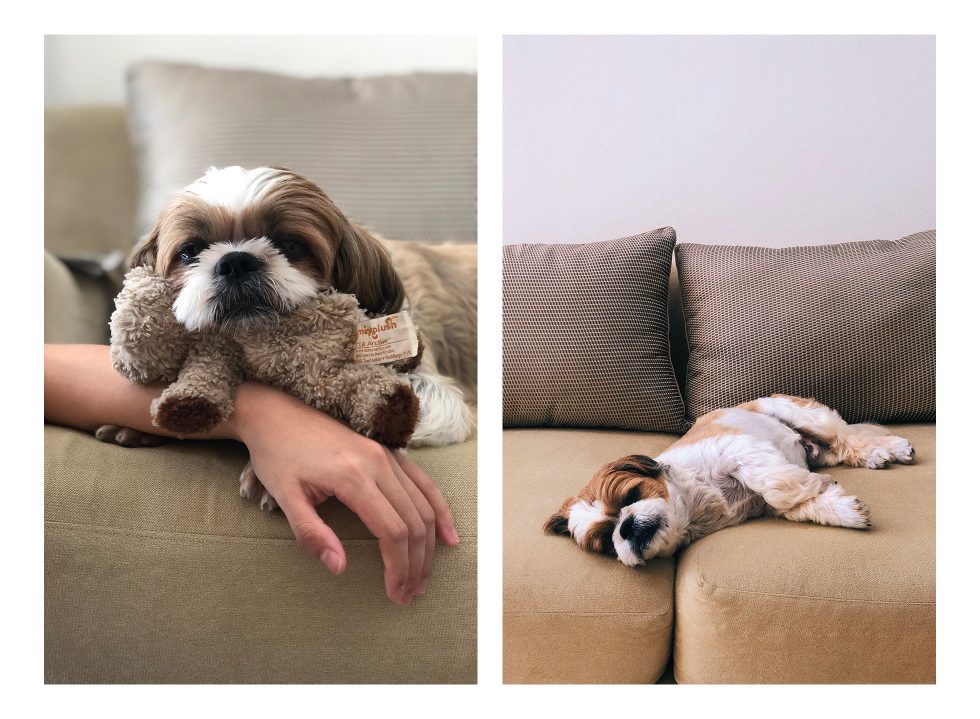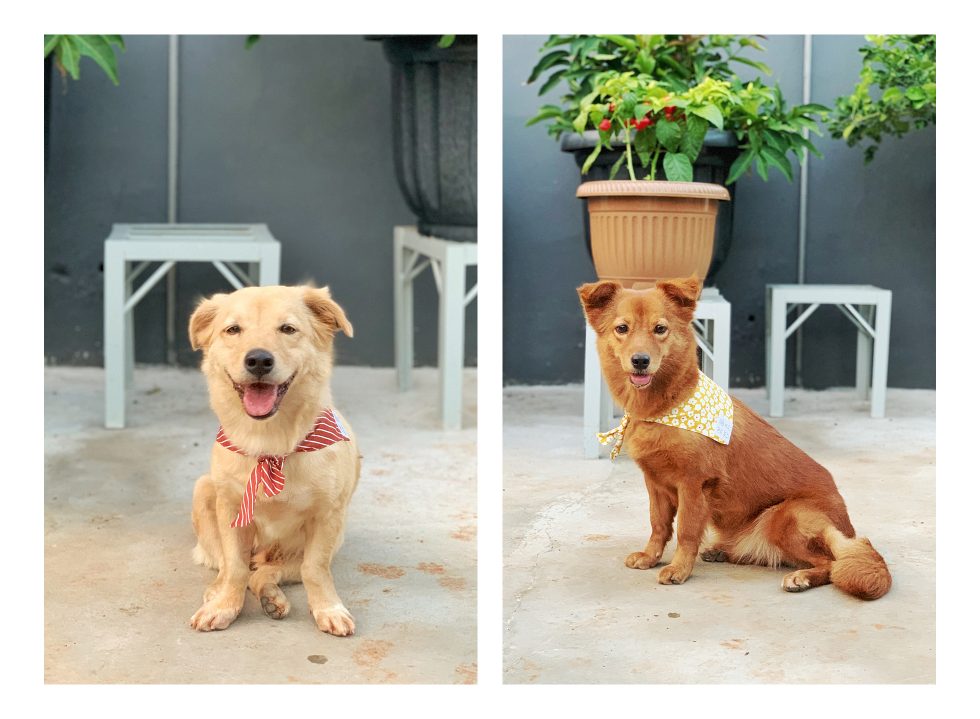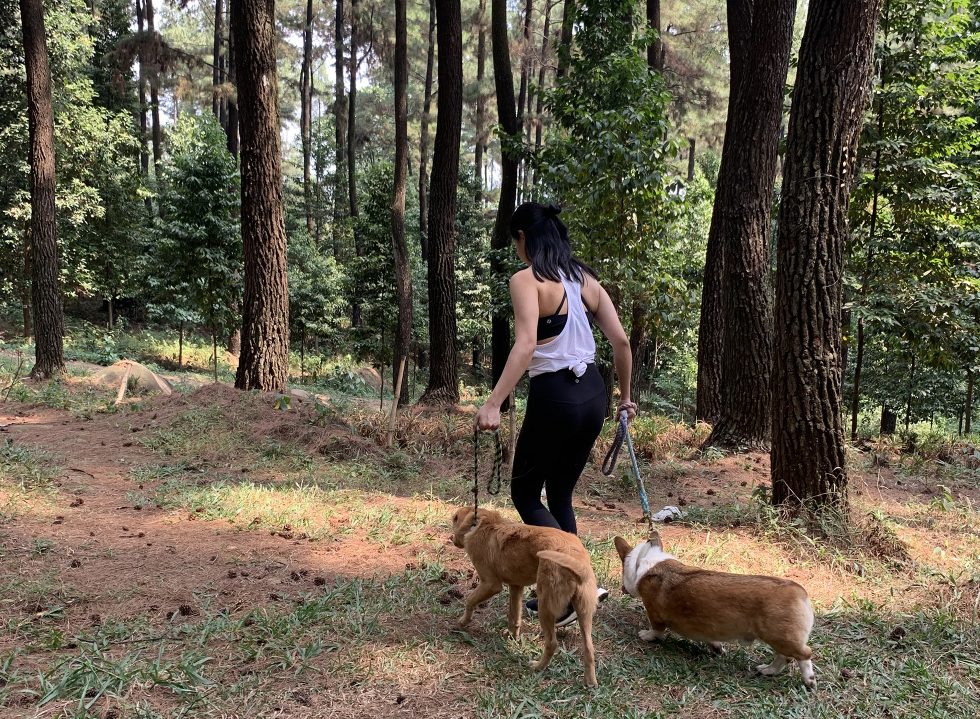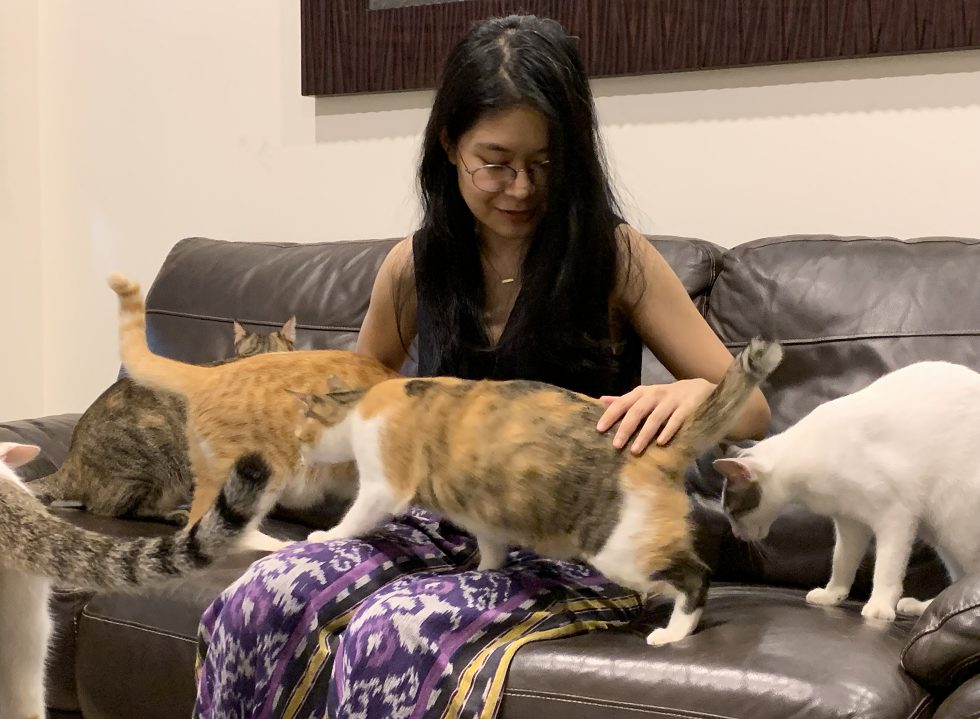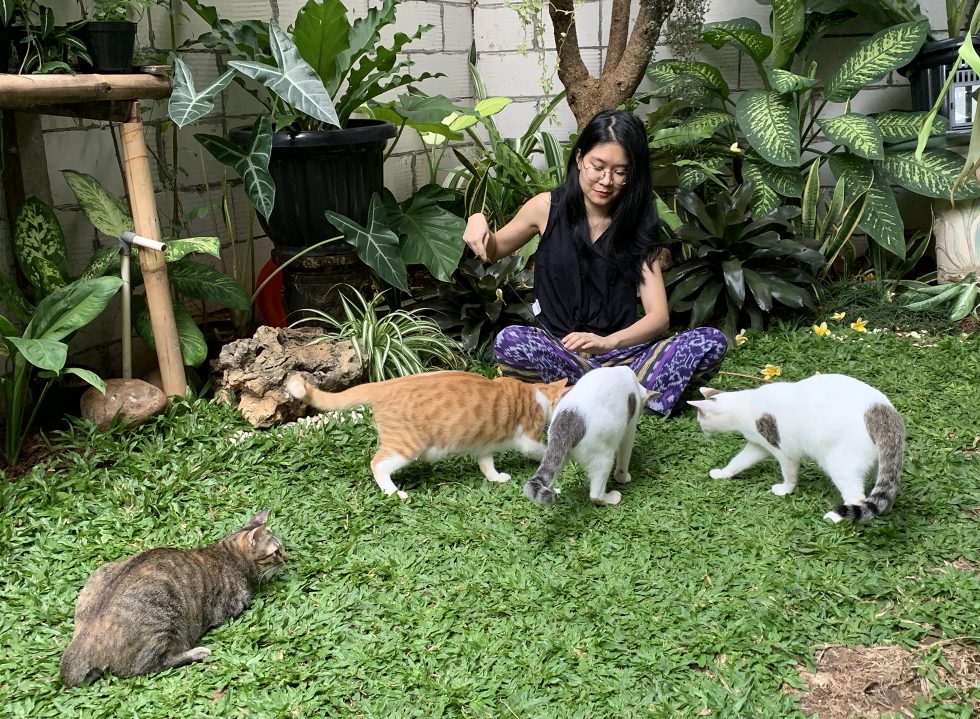Meet Amma, Nuka, Soren, Bang As, Ucat and little Yuki. Together, they stand on 24 legs and have Mustika Larasati Hapsoro as their mum (and sister/auntie on certain occasions). By day, they lounge somewhere in Mustika’s home. By night, things aren’t drastically different. Rather understandable since they are nonchalant house cats and do what cats typically do at home. Yet, Mustika sees them as irreplaceable companions who have made her life better.
“She was this small, sad-looking street cat but she had these beautiful striking green eyes,” Mustika recalled about Amma, her first adoptee, though at the time she didn’t know it yet. Mustika never had serious pets besides the few fishes now and then. Amma had taken shelter in her family home, hiding two newborns who Mustika later named Nuka and Sorren. “I took them in with the initial thought that this would be temporary.”
The thirty-year-old stood corrected.
The unplanned adoption occurred around the same time as Mustika’s younger sister got married and left the nest, which coincided with the first few weeks of the pandemic before everything ran amok. As siblings, they were each other’s rock through the years of growing up in different countries so Mustika couldn’t help but feel “a little mellow” about this big change. Then came Amma and her kittens to distract Mustika from the loneliness caused by the departure of her sister. “Caring for them distracted me from feeling that sense of loneliness. And now with six cats, it’s pretty hard to feel lonely,” Mustika laughed.
Mustika’s story, one with the unplanned adoption and the immediate joy that comes with it, has a similar tune to the many tales of animal adoption with happy endings. What’s different this time, her story with her six purr machines took place at the same time the world was jostled by the coronavirus pandemic and its devastating effects on our routines and normalcy.
After the first few weeks and months of quarantine measures, report after report recorded all-time high levels of loneliness in virtually every society hit by the pandemic, making mental health the other health epidemic that people had to fight alongside and within the restricted measures of the virus.
Like the discovery of newfound hobbies, pet adoption has reportedly spiked during the pandemic, too. The curve was attributed to the combination of time in our hands and also to sudden loneliness. Pandemic blues, the sombre emotional disorientation caused by the loss of normalcy and prolonged isolation, had many craving for social interactions and owning a pet seemed like the right solution.
Local data for pet adoption is weak (or rather nonexistent), but what’s certain for pet owners, regardless of whether they’re first-timers or not, is that they have experienced the tremendous benefits of having animal companions, especially in regards to physical and mental health.
But what is it about pets and their ability to cure an inherently social problem such as loneliness? Prolonged loneliness is linked to a higher risk of depression, with pet-less people being more likely to suffer from it. Numerous studies conducted to explore the curious dynamics of animal-human relationships have shown with a resounding “yes!”, pets indeed contribute to our overall health and happiness. It’s a relationship that, despite its barriers (with language being the foremost obvious one), can fulfil social needs that are necessary for humans to maintain a healthy mind.
Pets make a good distraction in terms of giving us a reason to restructure our life to fulfil these different needs.
Inherently, humans thrive on the feeling of being in control, which entails predictability and structure. When the pandemic settled for long ongoing months, the changes that were forced upon us were everything but within our personal control. Our “contract” with pets (their need for us to take care of them) is not only rewarding to accomplish but also fulfilling a human need as intelligent social creatures to be in charge, needed and wanted.
With Mustika’s six cats (which hasn’t been clarified but short story, our lady Amma gave birth to the rest of the clan after adoption), her hands are full with feeding, playing and poop-scooping tasks, and she’s a-okay with it. From balancing work and cat duties, she sees newfound diligence in herself for time management and finances (“Taking care of cats isn’t cheap, especially when you have six!”). Pets make a good distraction in terms of giving us a reason to restructure our life to fulfil these different needs.
“It does take my mind off things,” echoed Jo Reiner Widjaja, co-founder of social business The Pawsome Project and ‘pawrent’ to 12-year-old Pokka the shihtzu. “It keeps you sane. It is also fulfilling because there is nothing more rewarding than seeing him happy and giddy after a meal, or being playful after a fresh shower and a blow-dry.”
There’s also the extra health boon for dog owners especially, like Jo’s partner in crime in the project, Rika Sulaiman. With six furry canines (Jordan, Emma, Jill, Finn, Polo and Bolo—all mutt rescues except Jordan the corgi), their afternoon walks are bursting with energy that Rika gladly keeps up with as a great excuse to exercise every day. “It really gives [the dogs] real joy and unconditional love in my life,” she concluded.
In addition to the healthy distraction that builds structure and discipline into our social lives, the companionship of pets gives us touch. Yes, the simple literal gestures of running our fingers through their fur, squishing their toe beans and booping their noses are proven to help heal mental dread.
“If some people find watering plants therapeutic, I find combing [Pokka’s] fur to be my form of therapy.” – Jo Reiner Widjaja
Touching is a basic human need, in which partaking in that tenderness with a creature of affection triggers the release of the ever-sought happy hormones: dopamine and serotonin. This chemical reaction in our brains unleashes the feeling of happiness and relaxation, so powerful as if at that moment everything is okay, and if not, it will be. It’s the same hormones that run when you’re invested in life’s greatest pleasures: kissing, hugging, or taking a bite of your favourite dessert.
The effect is similar even with pets when we’re physically in contact with them. And during the pandemic, touch went from a right to a luxury we could not afford. Jocelyn Desiree is a young graphic designer who, like many of us, completely halted all sorts of gatherings and physical contact when the spread of the virus became all too alarming. She found solace in the presence of the three-year-old Dachshund and Pomeranian mix named Dunkin living under her roof.
Add to the fact that Jocelyn is a freelancer working from home, the experience of the pandemic has been especially isolating and stressful for this creative worker. And call it a canine sixth sense or a work of magic, Dunkin could read the agony that surrounded her best friend, for whom she automatically dialled down her usual pup energy and hyper demeanour to calmly greet Jocelyn with a reassuring snuggle. “It’s as if she knows how to match my energy,” said the 27-year-old.
These gestures pet parents do (or their pets extend) are irreplaceable therapeutic pleasures. “If some people find watering plants therapeutic, I find combing [Pokka’s] fur to be my form of therapy,” Jo explained.
Some of the deepest connections formed with pets happen in these moments. For Jo, he still recalls the times when Pokka assumed the role of loyal sidekick during Jo’s darkest days when his father was diagnosed with cancer and moved abroad for treatment. For Mustika, Nuka’s instinctive switch-off from crazy kitten mode to love bug when her human mum was grieving the passing of a family member won her mum’s deepest affection as she held the kitty cat in her arms to share that dolour.
Presence, the kind that pets provide, heals all sense of loneliness. It’s a mystery whether animals are deliberate with their actions, but for pet parents, what matters is that their fur babies extended their paw during the moments their owners needed to be held the most, without having to say a single word.
“Caring for them distracted me from feeling that sense of loneliness. And now with six cats, it’s pretty hard to feel lonely.” – Mustika Larasati Hapsoro
For what pets can do for their owners (or generally do by being themselves—kneading cats, anyone?) it’s no wonder that their very presence is enough to pull on our heartstrings. When Rika travels abroad, souvenir shopping at the local pet shop is a must for her band of pooches awaiting her back at home. Mustika submits herself to a strict financial plan for her colony of six. The idea to love, feed and scoop the poop of a creature living rent-free in our homes can be quite unfathomable to non-pet parents. Yet, it happens every day. Or as Jo said of his pet: “Pokka is a snob, but most importantly, I love him to death.”
With the outpouring of love Jo and Rika have for their furry family members, animals became their life calling which materialised into The Pawsome Project. The latter is a small-scale business and “fund aggregator” whose proceeds from the purchase of merchandise and donations go towards the welfare of animals in shelters and wildlife conservatories in Indonesia, which are notoriously underfunded.
Pawsome channels donations for these programmes by inviting donors to consistently participate, for which so far they’ve worked with Shelter Pak Johan in Banten, Komet Shelter in Bandung, Barumun Wildlife Conservatory, Maria Stray Home, Yayasan Sarana Metta, and Pejaten Shelter. Through this initiative, The Pawsome Project has been able to gather food, toys and funds for spaying and neutering stray animals. And as a small charity, they avoid showing the poor conditions of these animals, claiming that too many people cannot digest the truth and prefer avoiding it altogether. “[The Pawsome Project] would like to change the perception of charity to get people to start doing good and lend a helping hand,” Jo explained.
While the pandemic saw a surge of enthusiasm for adoption (which, objectively speaking, is truly welcomed by shelters everywhere), the process isn’t as simple as sending an animal to a willing home. Shelters still struggle with ghastly underfunding and not every home is a good fit for the animal. For one, many fail to realise that pet ownership is more than first-sight bonding with “the one” but also a serious lifetime commitment with preparedness that cannot be rushed.
Animals and especially the ones we’ve committed to adopting into the family are truly special in the way of their tremendous impact on our well-being. But in addition to that, animal-human relationships teach us about the importance of presence and companionship in the face of isolation. How come these animals are equipped to remedy loneliness? Like previously said, it’s a mystery, but it works.

